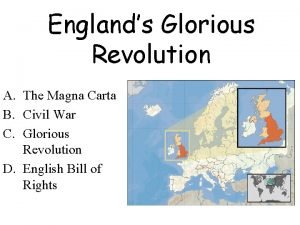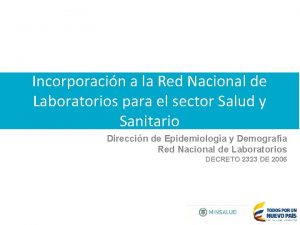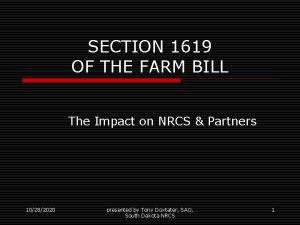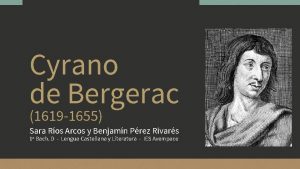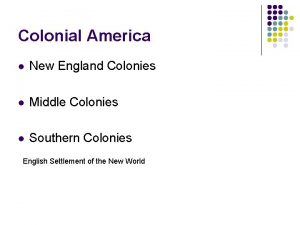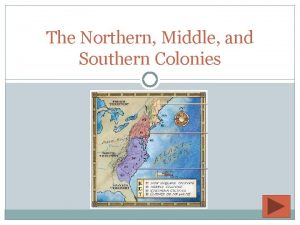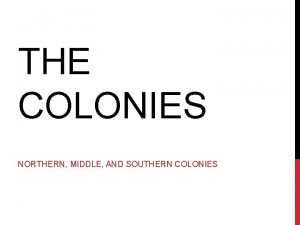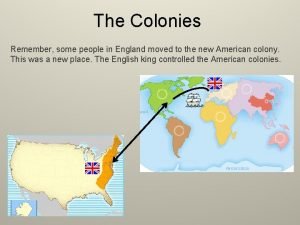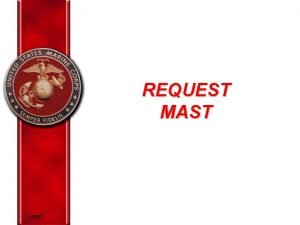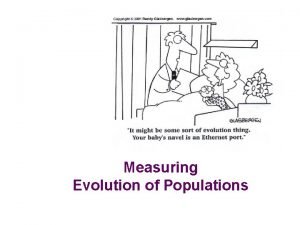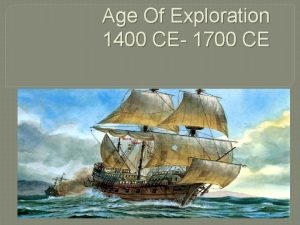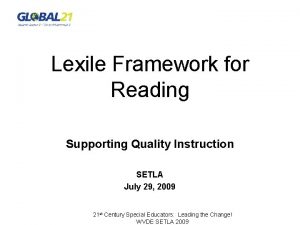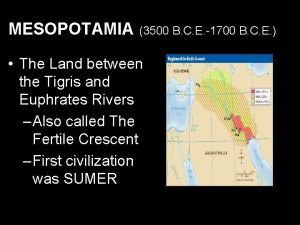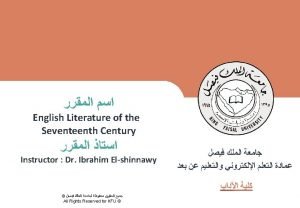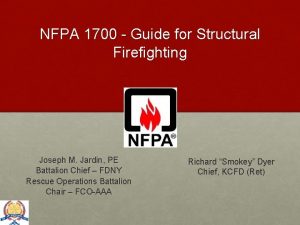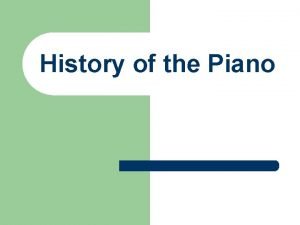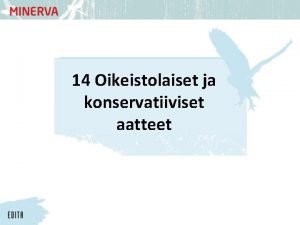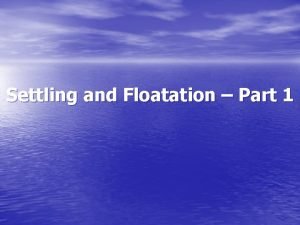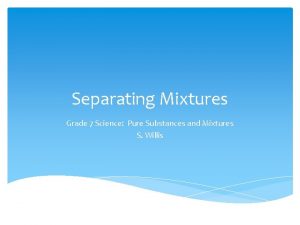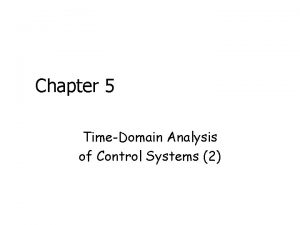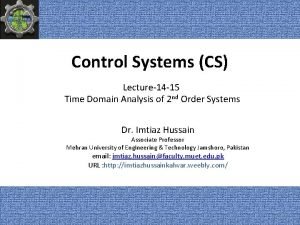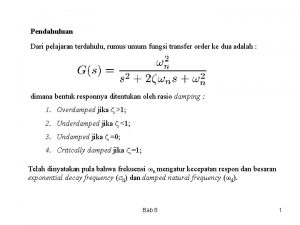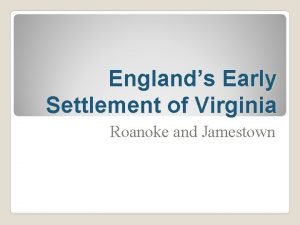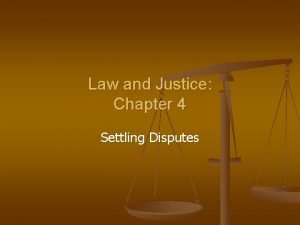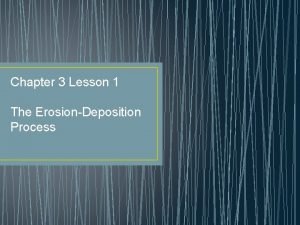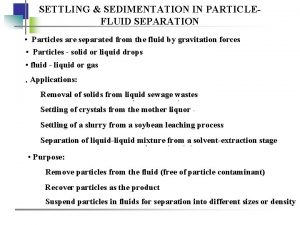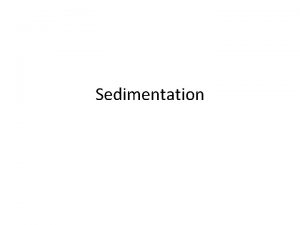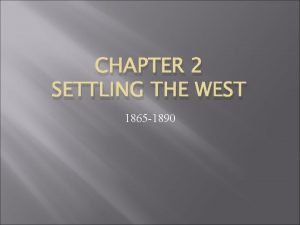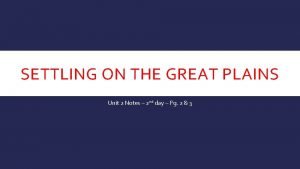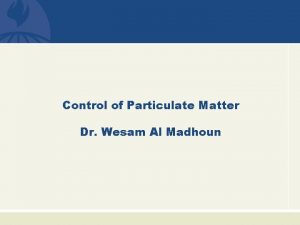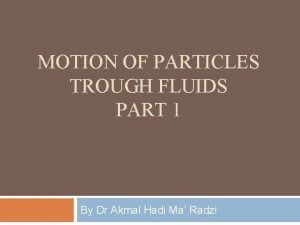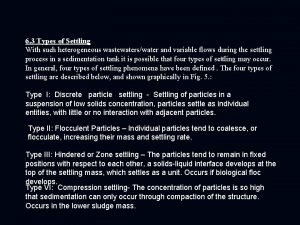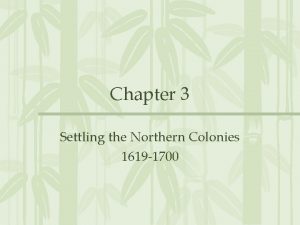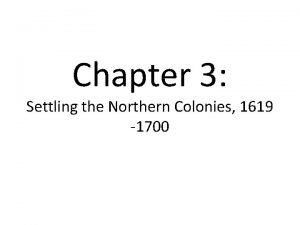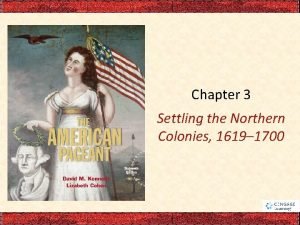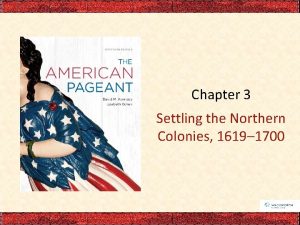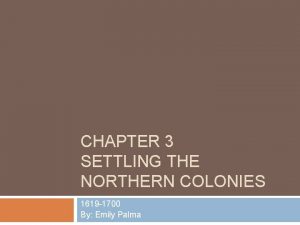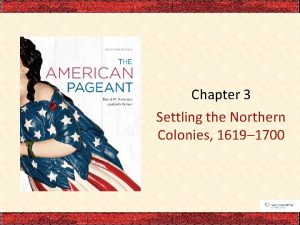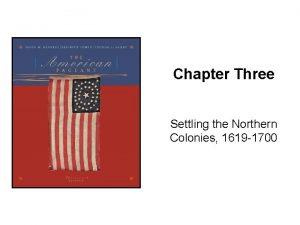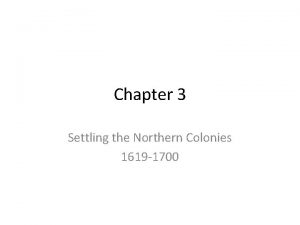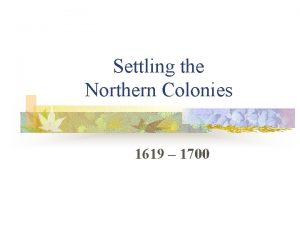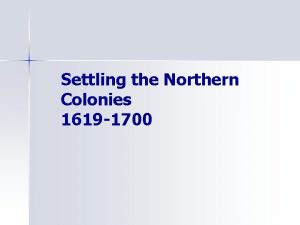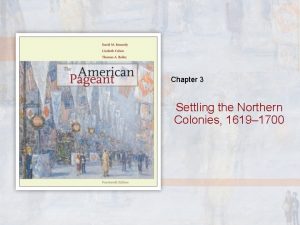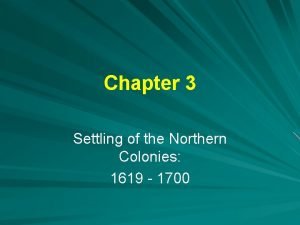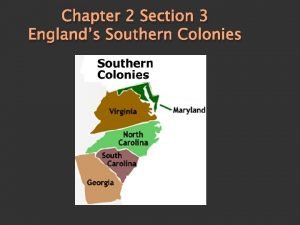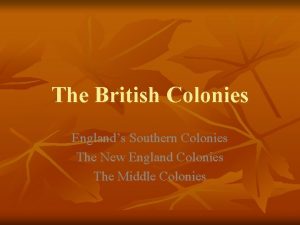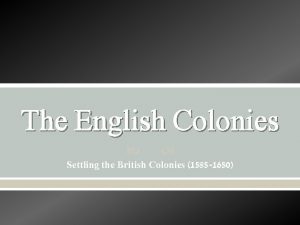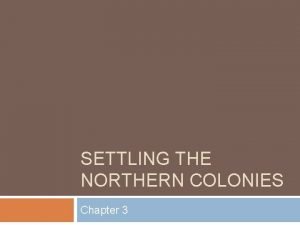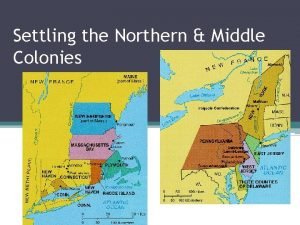Settling the Northern Colonies 1619 1700 4 Englands






















































- Slides: 54

Settling the Northern Colonies 1619 -1700

4. England’s First Settlements • Causes • Roanoke • Jamestown 5. Contributions of Jamestown 6. Pilgrims = Separatists: 1620 notes

• Difficult winter (44 out of 102 survived)…. • First year went through a “starving time” • Developed friendly relations with Indian tribes • Squanto befriended settlement • Plymouth settlement survived under the leadership of Gov. William Bradford • First Thanksgiving

Contrast with Virginia: Different environment & key role of religion for Puritans n Congregationalists & Separatists n Pilgrims (the latter) found Plymouth (1620) n – Fled Religious and Political Persecution

James I (1603 - 1625) • James I was the son of Mary, Queen of Scots. He had become James VI of Scotland after Mary lost her head, and he became James I when he took over England. • He was the first to call himself "King of Great Britain. " James struggled with Britain Parliament - he thought he ruled by divine right • There was a new English translation of Bible - the "King James Bible. “ • He persecuted Pilgrims because they Pilgrims would not recognize him as the religious leader of the Church of England. • So, they became a political risk as well.


• 41 Male passengers on the Mayflower formed into a “civil body politic”, signed a compact promising to write and obey "just and equal laws. . . for the general good of the colony. " • The compact brought an element of democracy to America and was an example of the practice of selfgovernment in the colonies.

In the name of God, amen…We whose names are underwritten, the loyal subjects of our dread sovereign lord, King James, by the grace of God, of Great Britain, France, and Ireland King, Defender of the Faith, etc, having undertaken, for the glory of God, and advancement of the Christian faith, and honor of our King and country, a voyage to plant the first colony in the northern parts of Virginia, do by these presents solemnly and mutually, in the presence of God and one another, covenant and combine ourselves together into a “civil body politic”, for our better ordering and politic

preservation and furtherance of the ends aforesaid; and by virtue hereof to enact, constitute, and “frame such just and equal laws”, ordinances, acts, constitutions, and offices, from time to time, as shall be thought most meet and convenient for the general good of the colony, unto which “we promise all due submission and obedience”. In witness whererof we have hereunto subscribed our names a Cape Cod the eleventh of November, in the reign of our sovereign lord, King James, of England, France, and Ireland, the eighteenth, and of Scotland, the fifty-fourth…. . AD 1620.

Pilgrims merge with the Puritans to form Massachusetts Bay Colony

4. England’s First Settlements • Causes • Roanoke • Jamestown 5. Contributions of Jamestown 6. Pilgrims = Separatists: 1620 7. Puritans = Dissenters 1630, City Upon a Hill Dissenters notes

• John Winthrop, founder of the Massachusetts Bay Colony • Middle class settlers, educated and organized • Successful as fur traders, fishermen and shipbuilders • Ruled as “Bible Commonwealth” or theocracy • New England Way = Puritan covenant with God • To establish holy society----”city upon a hill”

Charles I (1625 - 1649) • Son of James I and ruled by divine right. • Conflicts with Parliament = much resistance to his policies. • Forced to sign the Petition of Right • no taxes without Parliament’s consent; • civilians didn't have to house soldiers; • In 1629, Charles dissolved Parliament and ruled • no military law in peacetime until 1640. • Due process of law • Persecuted Puritans led to the Puritan Migration. • 1642– 1651: English Civil Wars, "Cavaliers" (Anglicans, royalists, nobility, Catholics) vs. the "Roundheads" (Puritans and Middle Class). • Charles I was beheaded in 1649 -------Oliver


v. Pilgrims merge with the Puritans to form Massachusetts Bay Colony v. Communities organized v. Established v. Protestant Ethic v. Family well towns Work values

New England Massachusetts New Hampshire Rhode Island Connecticut

New England 1. good harbors 2. small farms and towns 3. trade centered around harbors 4. hilly, forested and shallow soil 5. cities: Boston • 15, 000 – 1750 6. fishing, lumber and trapping 7. Family, religion and community


Colony/Date Person Responsible Massachusetts William Bradford • 1620—Pilgrims Plymouth Colony • 1630 ---Puritans Mass. Bay Colony • Pilgrims John Winthrop • Puritans • Plymouth merges with Mass. 1691 Religious freedom, avoid religious persecution, to start a “city upon a hill”, and to begin a new life. Mayflower Compact Theocracy General Court Royal Colony Rhode Island Roger Williams • Dissatisfied with Mass. Bay Colony • Religious freedom • Consent of the governed Religious freedom, exploring the frontier and settling new areas. Fundamental Orders of Connecticut • 1644 • Formed from Mass. Connecticut • Exiled from Mass. Anne Hutchison • Exiled from Mass. • 1635 • Formed from Mass. Rev. Thomas Hooker New Hampshire John Mason Sir Ferdinando Gorges • 1679 • Formed from Mass. Why Founded Part of Mass. Bay Colony and set up for greater opportunity in frontier---trade goods, fur, fishing & lumber industry Governed/Owner • Self-governing colony Royal Colony

Building the Bay Colony n n Franchise (right to vote) extended to “freemen” – adult Puritan men of Congregational church (about 40% of men in the colony ~ higher percentage than in England) However, in town government, all propertyowning males could vote in town meetings – Direct democracy----self government n Since idea of government was to enforce God’s laws, religious leaders (e. g. John Cotton) were very influential

Building the Bay Colony n n Clergy were barred from formal political office – early “church/state separation” Puritan ideas: “calling” to God’s work, Protestant work ethic, limited worldly pleasures, fear of hell

Trouble in Bible Colony (Puritan Rebels) n n n Social harmony when only Puritans, but that didn’t last Quakers: fines, floggings, banishments, executions Anne Hutchinson: truly saved don’t need to obey (“antinomianism” theological doctrine that by faith and God's grace a Christian is freed from all laws (including the moral standards of the culture) – Banished from Mass. Bay – Travels to Rhode Island with her children and helps organize this settlement

Trouble in Bible Colony (Puritan Rebels) n n Roger Williams: extreme Separatist, denied right of civil government to govern religious behavior, challenged charter for illegally taking land from Indians Avoided exile to England by fleeing to Rhode Island where in 1636, aided by Indians, he started a colony in the Providence area Started the first Baptist church Allowed complete freedom of religion

New England Spreads Out n n 1635: Hartford (Conn. ) founded by Dutch/English settlers. Some Puritans moved westward to Connecticut with Rev. Thomas Hooker 1639: Fundamental Orders – modern constitution established democratic government 1641: New Hampshire taken over by overly aggressive Bay Colony 1679: Annoyed by greed of Bay Colony, king arbitrarily separates it, becomes royal colony

Population of the New England Colonies

Growth of the Colonies: 1690

Population Comparisons: New England v. the Chesapeake

A G In ADAM'S Fall As runs the Glass, Our Life doth pass. We sinned all. B H Heaven to find; My Book and Heart The Bible Mind. Must never part. C J Christ crucify'd For sinners dy'd. JOB feels the Rod, -Yet blesses GOD. D K The Deluge Proud Korah's troop drown'd The Earth Was swallowed up around. L E LOT fled to Zoar, ELIJAH hid Saw fiery Shower By Ravens fed. On Sodom pour. F M The judgment MOSES was he made Who Israel's Host FELIX afraid. Led thro' the Sea N T Young TIMOTHY NOAH did view The old world & new. Learnt sin to fly. V O Young OBADIAS, DAVID, JOSIAS, All were pious. VASHTI for Pride Was set aside. P Whales in the Sea, GOD's Voice obey. PETER deny'd His Lord and cry'd. W X Q XERXES did die, Queen ESTHER sues And so must I. And saves the Jews. Y R Young pious RUTH, Left all for Truth. S Young SAM'L dear, The Lord did fear. While youth do cheer Death may be near. Z ZACCHEUS he Did climb the Tree Our Lord to see.


Middle Colonies New York Pennsylvania New Jersey Delaware

Middle Colonies 1. River systems 2. Valleys – fertile soil 3. . "bread basket" large farms - surplus food 4. diverse population 5. manufacturing 6. iron mines, glass, shipyards, and paper 7. Cities: New York and Philadelphia New York Pennsylvania New Jersey Delaware Middle Colonies

America, a “melting pot”

Chart 13 a Colony/Date Person Responsible Why Founded Governed/Owner New Netherland In 1609 --Dutch Henry Hudson for Netherlands New York— 1664 England Duke of York of England names it New York New Jersey---1702 Pennsylvania— 1681 Indian land---Dutch and Swedish gift from King Charles II to brother James--gives to his friends Lord John Berkeley & Sir George Carteret William Penn Swedes Delaware--1682 Maryland--1634 Lord Baltimore English fleet takes New Amsterdam from Dutch in 1664 and becomes New York City---Good harbor for trade New Netherlands was an autocracy 1689 ---English Bill of Rights Representative Govt Royal Colony Attract new settlers for Dutch and Swedish colonists Royal Colony Penn founded for religious freedom for the Quakers---Holy Experiment—invited all people Representative govt Religious toleration— those who believed in Christ---allowed persecuted Catholics to settle in Maryland Representative govt Royal Colony Proprietary Colony

New Netherland (New York) n n n 1609: Henry Hudson sailing for Dutch East India Company sails into Hudson river looking for passage through continent ~ claims area for Dutch 1623 -24: Dutch West India Company establishes New Netherland Goal: quick-profit fur trade “Bought” Manhattan from Indians Company town: no religious tolerance or free speech, harsh governors

New Netherlands & New Sweden

Urban Population Growth 1650 - 1775

New Netherland n n Colony had aristocratic influence (a member of a ruling class or of the nobility) with large feudal estates (“patroonships” – one larger than Rhode Island) Very diverse population: in 1640 s missionary observed 18 languages

New York Manors & Land Grants Patroonships similar to the fedual system

New York Harbor, 1639

New Amsterdam

Dutch Conflicts Dutch cruelties to Indians brought retaliatory massacres – Dutch built wall (Wall Street) n Connecticut rejected Dutch settlers n

Dutch in New York An Angry Peter Stuyvesant n n Duke of York n English immigration to New Netherland resulted in 1/2 total population - English regarded Dutch as intruders Charles II brazenly granted area to his brother (Duke of York) English squadron comes, New Netherland leader, Peter Stuyvesant, governor of New York had no defense; surrendered, renamed New

New Jersey Lord John Berkeley n n James gave 2 friends, Lord John Berkeley and Sir George Carteret, the section of New York located between the Hudson River and Delaware Bay in 1664 – He felt the territory of New York was too large to administer Both proprietors allowed religious freedom and an assembly in addition to giving generous land offers to attract settlers

n n Mid-1600 s: religious dissenters named Quakers arose in England Hated by authorities because they refused to pay taxes to Church of England, refused to take oaths, refused military

q. Penn’s family owed a large debt from the British Crown. Given a land grant in 1681. Pennsylvania q. Penn governs the colony, unusual for a proprietor q. Advertised in Europe, promising land & freedoms q. Frame of Government (guaranteed elected assembly), Charter of Liberties (freedom of worship, open immigration), fair treatment of Native Americans

Royal Land Grant to Penn

Penn & Native Americans

Penn’s Treaty with the Native Americans

Penn, more than any other individual founder or colonist, proved to be the That an example may be set up to the nations as. . . a chosen vessel through which the stream of holy experiment. demand for respect for individual rights was to flow so richly into our American William Penn reservoir of precious ideals. All men have a natural and infeasible right to worship Almighty God according to the dictates of their own consciences; no man can of right be compelled to attend, erect, or support any place of worship, or to maintain any ministry against his consent; no human authority can, in any case whatever, control or interfere with the rights of conscience, and no preference shall ever be given by law to any religious establishment or modes of worship. - William Penn, Declaration of Rights

Pennsylvania & Neighbors n n n Penn bought land from Indians ~ treatment of them so fair that Quakers went to them unarmed and even employed Indians as babysitters However, as non-Quaker immigrants came, they were less tolerant of Indians (Scots-Irish) Liberal features: elected assembly, no taxsupported church, freedom of worship, only 2 capital crimes

Delaware William Penn n Penn granted the lower 3 counties of Pennsylvania their own assembly n Governor was the same as Pennsylvania’s until the American Revolution

New England 14 12 Middle 5 10 3 2 9 4 6 1 7 8 13 11 Southern

14 2 10 12 9 1 6 3 4 8 5 11 13 7

Short Answer • A. Choose one of the following types of colonies listed below, and explain why it would be the best colony to live in. Provide at least one piece of evidence to support your choice. – New England – Middle – Southern B. Contrast your choice against one of the other options, demonstrating why that option is not as good as your choice.
 Englands glorious revolution
Englands glorious revolution Resolución 1619 de 2015
Resolución 1619 de 2015 Farm tools 1619
Farm tools 1619 Sara ja6
Sara ja6 New england middle and southern colonies venn diagram
New england middle and southern colonies venn diagram Southern colonies
Southern colonies What are the names of the southern colonies
What are the names of the southern colonies 13 colonies new england middle and southern
13 colonies new england middle and southern Mco request mast
Mco request mast Mechanisms of evolution
Mechanisms of evolution Christopher columbus significance
Christopher columbus significance Rotazione quadriennale 1700
Rotazione quadriennale 1700 Lexile framework for reading
Lexile framework for reading Cisco aironet 2800 設定
Cisco aironet 2800 設定 3500 + 1700
3500 + 1700 Puritan age in english literature
Puritan age in english literature Nfpa 1701
Nfpa 1701 1700 bce
1700 bce Rivoluzione agricola 1700
Rivoluzione agricola 1700 Esapideak zerrenda
Esapideak zerrenda To resize an embedded chart, ____.
To resize an embedded chart, ____. Piano 1700
Piano 1700 1700 luvun aatesuunta
1700 luvun aatesuunta Detention time in sedimentation tank
Detention time in sedimentation tank Sedimentation and flotation
Sedimentation and flotation How to separate mechanical mixtures
How to separate mechanical mixtures First order system equation
First order system equation Hazen formula for settling velocity
Hazen formula for settling velocity Yshss
Yshss Terminal velocity formula
Terminal velocity formula Settling time
Settling time Natural frequency transfer function
Natural frequency transfer function Settling jamestown
Settling jamestown Chapter 4 settling disputes
Chapter 4 settling disputes Lesson outline the erosion-deposition process answer key
Lesson outline the erosion-deposition process answer key Fluidization velocity
Fluidization velocity An ideal horizontal flow settling basin
An ideal horizontal flow settling basin Settling time control system
Settling time control system Gravitational settling chamber
Gravitational settling chamber Settling the west part 2 packet- farming the plains
Settling the west part 2 packet- farming the plains Settling the west 1865 to 1890
Settling the west 1865 to 1890 Gravitational settling chamber
Gravitational settling chamber Differential settling method
Differential settling method Settling on the great plains section 2
Settling on the great plains section 2 Gravitational settling chamber
Gravitational settling chamber Where can we find rotating arm sprays in sewage treatment
Where can we find rotating arm sprays in sewage treatment The settling of guest bill at the front office is done by
The settling of guest bill at the front office is done by Settling velocity formula
Settling velocity formula Types of settling
Types of settling Cái miệng nó xinh thế chỉ nói điều hay thôi
Cái miệng nó xinh thế chỉ nói điều hay thôi Mật thư anh em như thể tay chân
Mật thư anh em như thể tay chân Các châu lục và đại dương trên thế giới
Các châu lục và đại dương trên thế giới Bổ thể
Bổ thể Từ ngữ thể hiện lòng nhân hậu
Từ ngữ thể hiện lòng nhân hậu Tư thế ngồi viết
Tư thế ngồi viết
